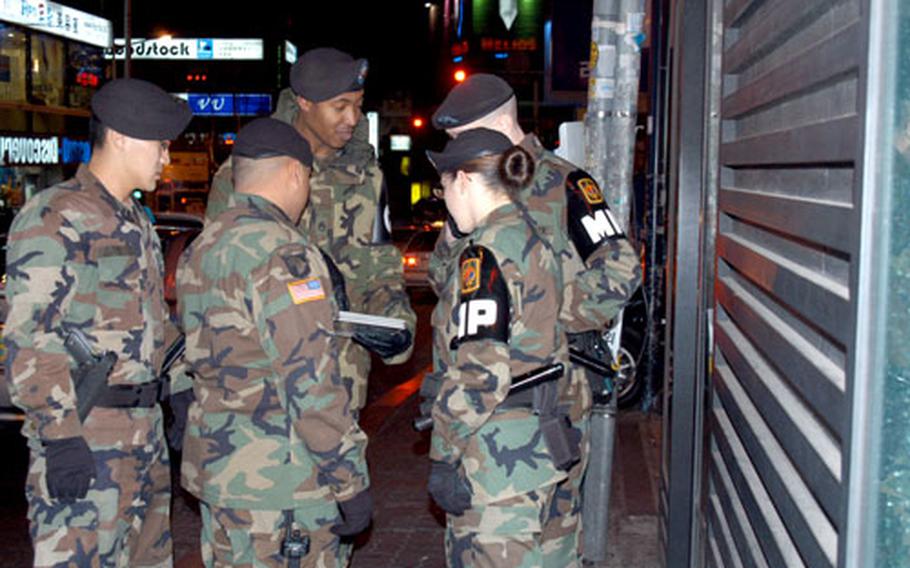
In this 2005 file photo, members of a courtesy patrol for Area II talk with military police officers on a Friday night in Itaewon, a bar district near Yongsan Garrison in Seoul. (Teri Weaver / S&S)
SEOUL — A high-profile confrontation over an illegally parked car outside a U.S. base has highlighted what appears to be a gray area regarding what authority American security forces have while conducting patrols on South Korean public land.
“No detailed rules exist,” said Park Sang Yung, police chief in Pyeongtaek, site of the confrontation outside Osan Air Base.
Even U.S. Forces Korea acknowledged that rules about the military’s policing authority outside its installations could be misinterpreted.
“Although the rules are clear, the situation may not be. Actions taken in an attempt to protect the force could easily be misconstrued as acting as law enforcement officials,” a USFK statement said.
The actions of USFK troops are always sensitive in South Korea, whether it’s breaking the law or allegedly overstepping their bounds. In this case, it could be both.
In coming weeks, South Korean prosecutors will weigh whether to press charges of illegal arrest against a group of U.S. airmen who handcuffed at least two South Korean civilians in a July 5 dispute over an illegally parked car 100-150 yards outside the Osan gate.
Their decision will hinge on interpretation of a handful of regulations and agreements.
The rules seem simple enough as codified in the Status of Forces Agreement and related regulations and agreements, which say troops are allowed to go off base to maintain order and discipline among troops and ensure USFK security.
They also say troops cannot enforce South Korean laws or take law enforcement measures against non-SOFA personnel unless there is a threat to military property or facilities. In such cases, anyone apprehended must be turned over to South Korean police immediately.
USFK said there are additional military regulations, standard operating procedures and local arrangements that govern what they can do. A spokesperson for the command issued a statement Friday saying it was obtaining copies of agreements with local police or governments for review to ensure they don’t conflict with SOFA and USFK regulations.
What could become a crucial issue in the Osan case is what constitutes a terrorist threat. While all South Korean officials interviewed for this story agreed that U.S. security forces could take actions in response to an imminent threat, all said there was no agreement with the U.S. on what poses one. The USFK spokesman said some agreements about off-base policing “are applicable to potential terrorist situations in a general sense such as threats to military property.”
Osan says the town patrol believed the parked car may have posed a force-protection threat. South Korean authorities say the car was too far from the base to pose a credible danger.
South Korean authorities say the airmen — part of a nighttime “town patrol” that regularly monitors the Sinjang shopping district outside Osan — asked the owner of a music store to move his car from in front of his shop, where it was in violation of local ordinance. The shop owner and two other men began to argue with the security forces personnel, who then handcuffed at least two of the men.
South Korean police say the security forces had no authority to handcuff the men. Osan says the airmen were defending themselves from an assault by the South Koreans. Video shot by bystanders aired on South Korean television, and showed people in civilian clothing surrounding the security patrol and the airmen roughly handling two men on the ground. Osan has said the crowd threatened the airmen’s safety.
Five of the airmen have been suspended from their town patrol duties pending the outcome of a U.S. military investigation. The USFK and 7th Air Force commanders also issued public apologies in the days following the handcuffing, and USFK town patrols across the peninsula are now banned from carrying guns.
Osan and Pyeongtaek officials have since increased efforts to conduct joint town patrols with South Korean police. The July 5 patrol was conducted only by Osan security forces.